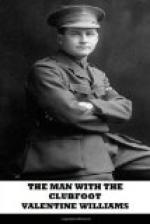From the Argyllshire hills winter has stolen down upon us in the night. Behind him he has left his white mantle, and it now lies outspread from the topmost mountain peaks to the softly lapping tide at the black edges of the loch. Yet as I sit adding the last words to this plain account of a curious episode in my life, the wintry scene dissolves before my eyes, and I see again that dawn in the forest ... Francis and Monica, sleeping side by side, like the babes in the wood, half covered with leaves, the eager, panting retriever, and myself, poor, ragged scarecrow, staring openmouthed at the Dutchman whose kindly enquiry has just revealed to me the wondrous truth ... that we are safe across the frontier.
What a disproportionate view one takes of events in which one is the principal actor! The great issues vanish away, the little things loom out large. When I look back on that morning I encounter in my memory no recollection of extravagant demonstrations of joy at our delivery, no hysteria, no heroics. But I find a fragrant remembrance of a glorious hot bath and an epic breakfast in the house of that kindly Dutchman, followed by a whirlwind burst of hospitality on our arrival at the house of van Urutius, which was not more than ten miles from the fringe of the forest.
Madame van Urutius took charge of Monica, who was promptly sent to bed, whilst Francis and I went straight on to Rotterdam, where we had an interview at the British Consulate, with the result that we were able to catch the steamer for England the next day.
As the result of various telegrams which Francis dispatched from Rotterdam, a car was waiting for us on our arrival at Fenchurch Street the next evening. In it we drove off for an interview with my brother’s Chief. Francis insisted that I should hand over personally the portion of the document in our possession.
“You got hold of it, Des,” he said, “and it’s only fair that you should get all the credit. I have Clubfoot’s dispatch-box to show as the result of my trip. It’s only a pity we could not have got the other half out of the cloak-room at Rotterdam.”
We were shown straight in to the Chief. I was rather taken aback by the easy calm of his manner in receiving us.
“How are you, Okewood?” he said, nodding to Francis. “This your brother? How d’ye do?”
He gave me his hand and was silent. There was a distinct pause. Feeling distinctly embarrassed, I lugged out my portfolio, extracted the three slips of paper and laid them on the desk before the Chief.
“I’ve brought you something,” I said lamely.
He picked up the slips of paper and looked at them for a moment. Then he lifted a cardboard folder from the desk in front of him, opened it and displayed the other half of the Kaiser’s letter, the fragment I had believed to be reposing in a bag at Rotterdam railway station. He placed the two fragments side by side. They fitted exactly. Then he closed the folder, carried it across the room to a safe and locked it up. Coming back, he held out his two hands to us, giving the right to me, the left to Francis.




